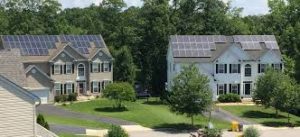THE PROS AND CONS OF SOLAR HOMES

Have you ever thought about getting solar panels for your home? Read here to find out some information.
Solar energy can be a great way to power your home while reducing your energy bills and being environmentally friendly. But there are some things to think about before making the upgrades to your home or considering the purchase of a solar home. Going solar has some downsides too that you may not be aware of. But let’s take a look at the advantages first.
Pros of Solar Energy
- Free Energy
Once the cost of installation is paid off, energy is free. As long as the money you will save in the long run is more than the money you will spend for going solar, it’s well worth it. If you’re planning on staying in your home for many years to come, installing solar energy can be a huge benefit to your wallet.
And if being environmentally friendly is one of your goals, the cost of installation may make the decision worthwhile. Solar panels normally have a 25-year lifespan so installing them now can save you money in the future. Over their lifetime, the average consumer with a monthly electric bill of $150 a month can expect to save around $30,000. The savings aren’t huge to begin with, normally around $50 a month, but the longer you have them, the more money you’ll save. As much as a couple hundred dollars a month.
- It’s Abundant
There will be plenty of solar energy to last your lifetime. In fact, NASA estimates that the sun will shine another 6.5 billion years and the earth’s surface currently receives 20,000 time more solar power than it needs to power the entire world. The bottom line is this . . . you’ll never run out of power!
- You Can Receive Financial Support
The federal government is willing to help you out with tax credits. Many state and county governments offer credits as well. There is currently a 30% Renewable Tax Credit in effect until at least 2023 that will offer you a credit to your federal taxes for solar energy usage. Depending on where you live, state and county governments all over the country offer a tax credit or rebate and some utility companies offer a rebate as well.
Not all the news is good though. Solar energy does have some downsides to consider.
Cons of Solar Energy
- Capital Cost
If your home wasn’t built to use solar energy, the cost to install it can be high. Depending on the size of your home and its layout, the cost of the panels plus the installation aren’t always cost effective. It’s important to consider the long-run and how long you will be using solar energy before laying down the money to make the upgrade.
Also, energy storage can be expensive. You will need a storage system that takes in and stores solar energy then distributes it when needed.
- It’s Not a Constant Energy Source
Solar power is not always constant, which is why you would need an energy storage option. The sun doesn’t shine at night, so it’s not generating any power then. Also, the sun shines at different intensities at different times of day and at different times of the year. And if there’s cloud coverage, your energy source is reduced. All reasons why you would need a storage option to allow you to store energy when it’s available and use it when it’s not.
- Solar Power Doesn’t Travel
Should you decide to move, the cost associated with moving and reinstalling your solar panels can be extremely high. Your metering agreement with your local utility company is fixed to your property so it can also cause some complications with moving your utility account.
But solar panels can add value to your home so it may be more cost effective to sell your home for a higher price because of the solar option and just reinstall at your new home. If you decide to go with this option though, it’s better to purchase your solar panels outright than to lease them. The new owner of your home may not want to agree to take over your lease agreement.
As you can see, there are several things you need to consider when deciding to install solar panels or purchase a solar powered home. Be sure to consider all your options before making a decision because installing solar panels or purchasing a solar powered home is a hard decision to take back later.
Leave a Reply